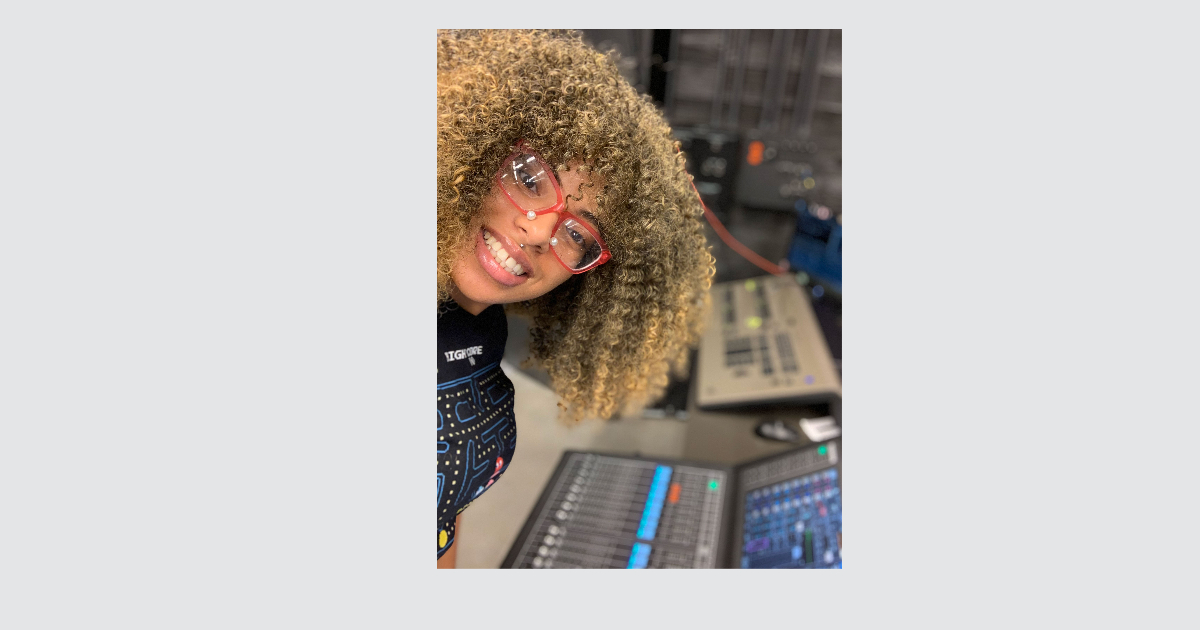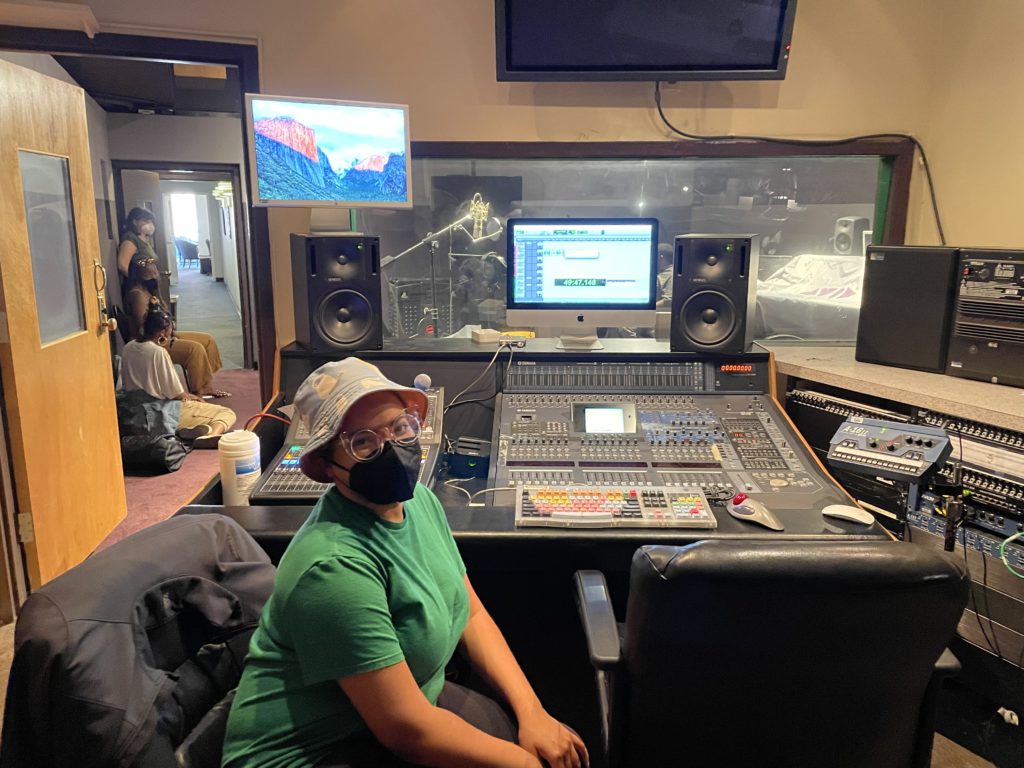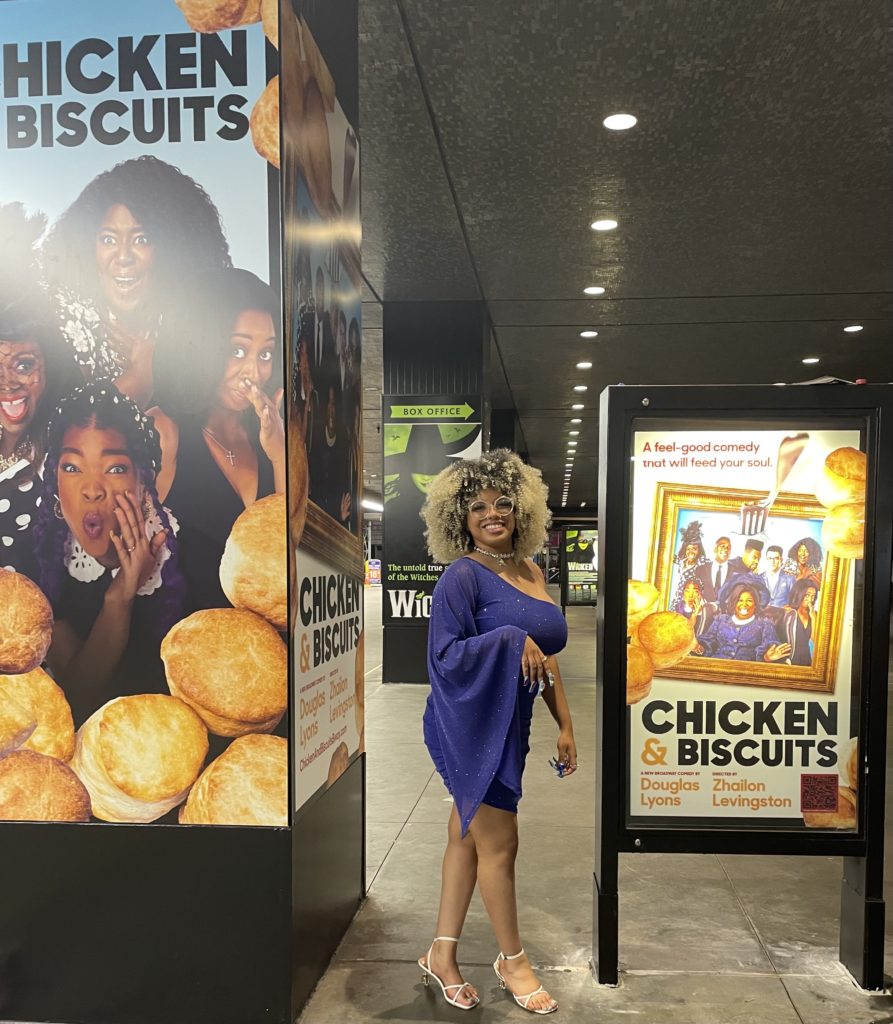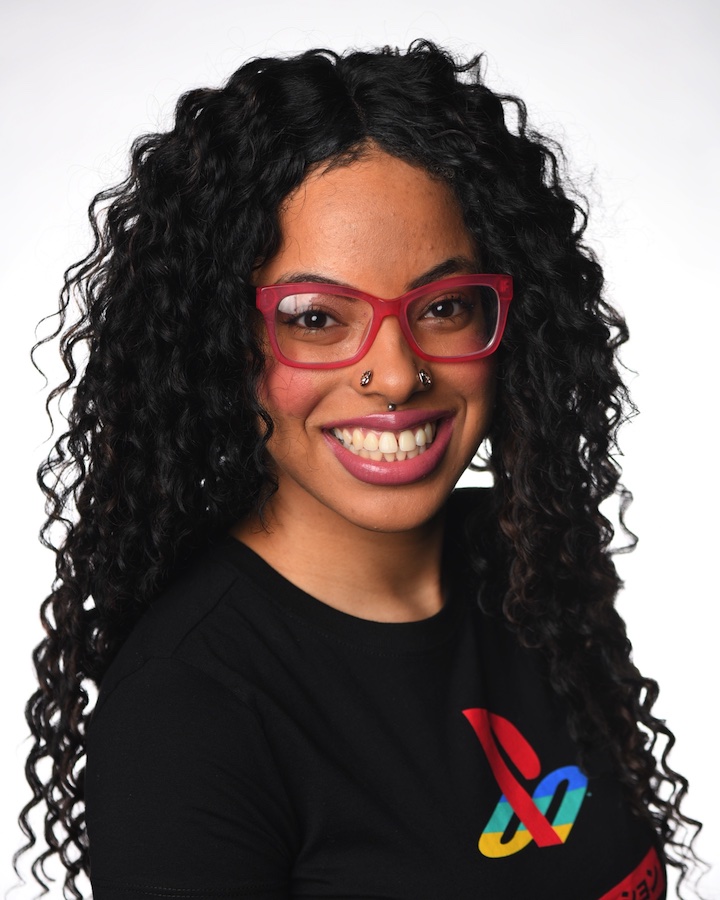
Twi McCallum – Sound Designer
Twi McCallum works on sound design for theater, post-production, audiobooks, and commercials. She has been freelancing since 2018 for Broadway, off-Broadway, and for regional theatres. Twi recently started working full-time at Skywalker Sound in sound editorial, and she will be relocating from NYC to the Bay Area.
Twi grew up in Baltimore and worked throughout high school at the National Aquarium, where she learned ocean conservation and marine biology. During the summers they created a play that was performed at local libraries. They would write the script, create costumes, backdrops, props, and music. This was Twi’s introduction to theater. She would go on to attend Howard University, where she found a class called TECH, where she became a crew member working behind the scenes for student productions. Twi remembers her first production, “my first tech assignment was a dresser for the musical Anything Goes, and there was a moment during invited dress when I was standing in the wings waiting for my actor to come offstage for a quick change. And I must have been standing in front of a speaker because I suddenly felt a wash of sound effects and music cascade over my body, and although I knew nothing about speakers, mics, or engineering at that time, I knew that’s what I wanted to jump into.”
Twi was working towards a Theater Administration major, studying things like stage management, producing, and technical theater. “At the time, my focus was costume design, which is laughable now, but there were no sound design professors and I failed my lighting and scenic design classes which is why I dropped out of school and moved to New York.” Twi would eventually graduate from Yale School of Drama’s one-year sound program in May 2021, which was virtual due to covid.
Her first job in NYC was a technical apprenticeship at a dance company called New York Live Arts, which was the first time Twi learned the fundamentals of audio such as how to stand on a ladder to hang a speaker, using a c-wrench, dropping a file into QLab, what an XLR cable is, and the basics of a mixing console which was the Yamaha DM1000. Twi says she knew she wanted to be a sound designer “because I was more moved by watching the dance performances than I was mixing them, and of course, getting yelled at as a mixer because nobody talks to the sound person unless they need to scold.”
When the apprenticeship ended, Twi worked as a stagehand at the Manhattan School of Music while sending her resume to a bunch of theaters that Twi said: “I was grossly underqualified for.” Her first design gigs were for Cape May Stage, TheatreSquared, and Kansas City Reps– all regional theaters that took a chance on her.
During covid, Twi took a post-production internship at a foley studio called Alchemy, and because of that opportunity, she was immediately hired as an apprentice sound editor on two scripted television shows for NBC and STARZ which allowed me to join Motion Picture Editors Guild Local 700. Those jobs qualified her to be hired at Skywalker Sound.
What did you learn interning or on your early gigs?
My one quirk is that I write everything down… when I’m at work I’m constantly scribbling in a notepad. My first job in New York was a technical theater internship (although criminally underpaid and abusive) at a dance company called New York Live Arts. It was my first time learning the basics of audio, and I still have my notebook from 3 years ago. I wrote down everything I learned…what does this button on the Yamaha DM1000 do, this is how many pins an XLR cable has, this is what a cluster is vs what a line array is. There is nothing embarrassing about needing to take notes, and there were times that it saved me because someone on the staff would ask me a question about the system that nobody else could answer but there it was in my trusty notebook! Even when I transitioned into post-production last year, I began keeping a typed journal of things I learned every day. My first professional television gig was as a sound apprentice on STARZ’s The Girlfriend Experience season 3, and the first thing my sound supervisor taught me was the importance of making region groups in ProTools for every episode. A year later, I still refer to those instructions whether I’m working on a professional tv show or an indie film.
Did you have a mentor or someone that really helped you?
My first mentor in theater sound was Megumi Katayama. There was a time in my life 2-3 years ago when I didn’t know any sound designers and I was emailing as many of them as I could find to inquire about their process. Megumi was a recent Yale MFA graduate when we met, already making strides with sold-out productions. I told her that I wanted to apply to Yale, so she invited me to assist her on production at Long Wharf Theater, which allowed me to tour and interview at Yale for my application. To this day she is still the only designer I’ve ever assisted.
My other theater sound design mentor is Nevin Steinberg, a legend, known for mega Broadway shows like Hamilton, Hadestown, and Dear Evan Hanson. When I emailed him as a fan with no major work experience, he called me on the phone the next day to my surprise, and since then he and I have talked at least every few weeks the past 2 years, sometimes just to make sure I’m emotionally okay.
In post-production, my biggest mentors are Bobbi Banks (ADR supervisor), Dann Fink, (loop group coordinator), and Bryan Parker who is a Supervising Sound Editor at Formosa Group and spent 6 months training me in sound effects and dialogue editorial. As I begin a new journey at Skywalker Sound, I admire Katy Wood, who I plan to work closely with over the next year.
I would be remiss if I did not mention that mentors also show up outside of my craft as a sound designer. The folks who always recommend me for big jobs, introduce me to directors, and take care of me in the workplace are costume, scenic, and lighting designers like Dede Ayite, Adam Honore, David Zinn, Clint Ramos, and Paul Tazwell. I advise any sound girl to reach out to other artists outside of audio to build a robust community.
Career Now
What is a typical day like?
In theater, I typically spend two weeks prior to tech being hands-on preparing for a production. This includes chats with the director, conceptual meetings with the scenic & lighting designers, group production meetings, and visiting rehearsals as often as possible. I also do a lot of paperwork such as cue sheets, console files, gear lists, and ground plans. Tech is typically 1-2 weeks long, and thankfully the theater industry is progressing away from the brutal 10 out of 12-hour workdays and six-day work weeks. Tech means stepping through every page of the script with all of the actors fully encompassed in the design elements. Then, there are usually 1-2 weeks of previews, which means a short rehearsal during the day to fix notes and a public audience performance in the evening.
How do you stay organized and focused?
My calendar is the key to me staying organized, Google calendar works miracles. As lame as it sounds, I maintain a daily, weekly, monthly, and annual to-do list. Annual to-do lists may feel overboard, but you’ll feel rewarded when the holiday season arrives and you realize you accomplished a long-term goal that you visualized 10 months prior. I am still learning to stay focused while acknowledging focusing doesn’t need to look the same for everyone. When I’m working from home, I like sitting on my couch with my laptop and listening to my tv in the background so I don’t feel alone. The best advice about focus that I’ve gotten from artists: spend 15 minutes every day in complete silence (from a costume designer), and try spending the first 1-2 hours every day that you wake up without any technology (from a playwright). Reducing social media usage has become critical for me, especially the drama of Instagram and Facebook.
What do you enjoy the most about your job?
What I love the most about theater sound design is sitting in the audience watching my show and being swarmed with the real-time reactions of the audience. The laughter, claps, cries, and yells, especially if it’s a result of a perfectly timed sound effect, assure me that I’ve done a great job. In theater, you will hear lots of designers say this theory, “The design is good when you don’t notice it.” But I disagree with that because there’s a line between noticing when your design is bad versus noticing when your design is compelling the storytelling. I like to believe we go to the theater to not only notice the actors but to enjoy the physical world of the play (scenic and costumes) and visceral world of the play (lighting and sound). I want the audience to notice my gunshots, earthquakes, music transition, spaceship takeoff, alarm clock, etc because they’re small yet inspiring parts of the bigger puzzle. For example, I designed a production of STEEL MAGNOLIAS at Everyman Theater and my director was adamant about the big gunshot moment, so I drove the point home and made it terrifying. I loved reading the performance reports via email from the stage manager every night that noted the audience jumping and holding each other at the surprise of the gunshot.
What do you like least?
In theater, I dislike the lack of budgeting of time and money from producers, production managers, directors, and other folks in power. Money is always used as an excuse for why designers, including sound designers, cannot be given the resources, staffing, and pay to properly do our jobs. There’s also a disregard for equitable scheduling of pre-production, rehearsal, and tech that impacts our personal lives.
What is your favorite day off activity?
I play a lot of zombie video games (team PlayStation), plus I spend time with my Goldendoodle and pet snails as my happy places in my personal life. I’ve been watching some television shows, which are new to me because I’m more of a film lover. It took me a month to finish The Walking Dead but it was worth it, and I love Money Heist, You, Pose, Judge Judy, Top Chef, and Squid Game.
What are your long-term goals?
In 5-10 years, my heart is gazed upon being a re-recording mixer and supervising sound editor for big-budget film, television, and video games. I’m leaving behind theater sound design to transition into theatrical producing, so I can focus more on my post-production career. Eventually, I would love to teach sound design at an HBCU.
What if any obstacles or barriers have you faced? How have you dealt with them?
“Making it” is hard. However, I like to believe many of us make it over that hump eventually. What I wished someone talked to me about 2-3 years ago is what happens AFTER “making it”. For me, the insecurities have not stopped. At 25 years old and well-accomplished for my age according to other people… I am still comparing myself to others, taking it really hard when I don’t get hired for a particular show, and constantly wondering if I will maintain a career of longevity. And as a woman of color, surrounded by men as well as white women who have consistent streaks of accomplishments, I feel this sense of failure more often than people imagine. There are days that I cry, I wonder if I should change careers, I question if I will ever outdo myself and my peers. It’s important that I’m real and honest about these things because I know I’m not the only woman of sound in the world to experience these growing pains. This is where making a self-care plan kicks in, often we discuss self-care regarding busy schedules and needing time off from work. But self-care is also needed as a reminder to love ourselves and balance the highs and lows of our careers, even the lows that we are embarrassed to talk to other people about.
Advice you have for other women and young women who wish to enter the field?
Try your hardest not to take underpaid jobs. Even when you are first starting, do not take a gig that does not pay at least the legal minimum wage. Money is important, despite being in a craft where we’re supposed to love what we do unconditionally. Women are already underpaid and under-hired in sound, which makes us even more valuable. Companies that thrive on underpaid labor should not exist. The only places you should “volunteer” your time are schools, mentorship programs, and community theaters, all with a grain of salt of course. If you ever need to weigh the tradeoffs of taking a certain gig, do not be ashamed to reach out to someone with experience to ask for advice.
Must have skills?
The most important skill, in theater and post-production, is being able to quickly learn software. This includes drafting software like Vectorworks and DAWS like ProTools. Once you learn the basics of the software you need for work, the next challenge is learning how to use them efficiently. “Shortcuts” become important in the workplace, especially in post-production when it saves you 60 seconds of labor if you know a keyboard hotkey compared to needing to navigate a menu for the same function. These skills are not simple to learn, so be gentle with yourself on this learning journey. There are manuals and flashcards for all software, even ProTools keyboard covers to purchase!
Favorite gear?
In theater, I love Meyer’s SpaceMapGo. I implemented the software on my Broadway play CHICKEN & BISCUITS, to help move music and atmospheric cues around the theater in a 3D motion. In post-production, a similar asset is a plug-in called Waves Brauer Motion.
Summary of accomplishments
- Sound designer for Chicken & Biscuits on Broadway, running September 2021-January 2022, as the first woman of color sound designer on Broadway and woman #9 overall.
- Co-Vice Chair of Theatrical Sound Designers & Composers Association.
- Highlighted off-Broadway theater credits include: A Commercial Jingle for Regina Comet (musical), A Turtle on a Fence Post (musical), and Little Girl Blue-Nina Simone (musical).
- Highlighted post-production credits include: SULWE audiobook by Lupita Nyong’o (dialogue editor), Amazon commercial (sound editor), In Love & Struggle audiobook by Audible (sound designer), and radio plays for The Kennedy Center, Atlantic Theater Company, and The Public Theater.
More on Twi
https://open.spotify.com/episode/2aZE4fsUKT3pwFm3VAE4PE?si=FSn-cQGRQ8KxmN-z88xBeQ


